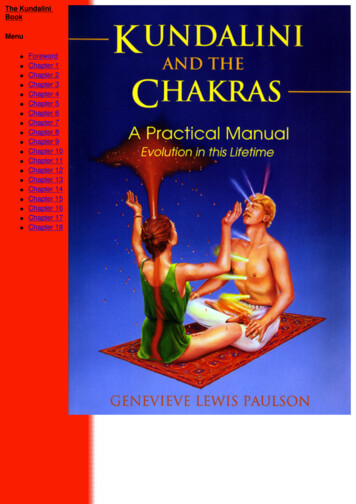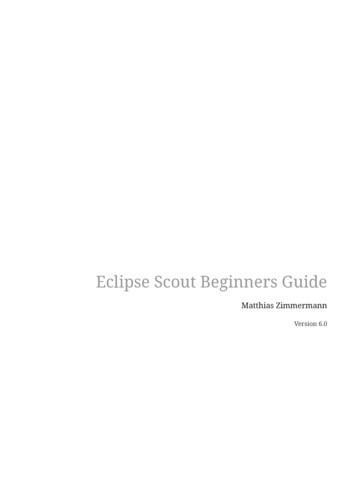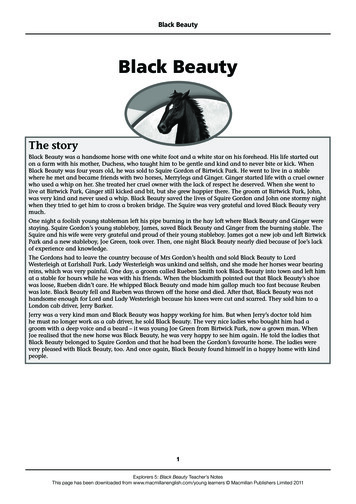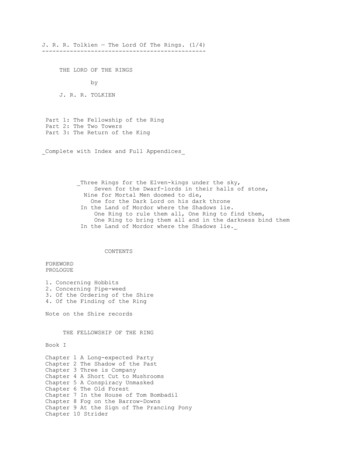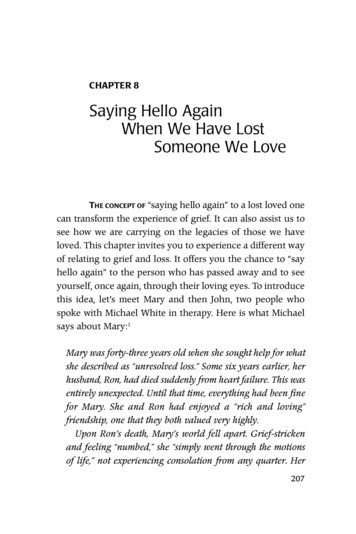
Transcription
Chapter 8Saying Hello AgainWhen We Have LostSomeone We LoveThe concept of “saying hello again” to a lost loved onecan transform the experience of grief. It can also assist us tosee how we are carrying on the legacies of those we haveloved. This chapter invites you to experience a different wayof relating to grief and loss. It offers you the chance to “sayhello again” to the person who has passed away and to seeyourself, once again, through their loving eyes. To introducethis idea, let’s meet Mary and then John, two people whospoke with Michael White in therapy. Here is what Michaelsays about Mary:1Mary was forty-three years old when she sought help for whatshe described as “unresolved loss.” Some six years earlier, herhusband, Ron, had died suddenly from heart failure. This wasentirely unexpected. Until that time, everything had been finefor Mary. She and Ron had enjoyed a “rich and loving”friendship, one that they both valued very highly.Upon Ron’s death, Mary’s world fell apart. Grief-strickenand feeling “numbed,” she “simply went through the motionsof life,” not experiencing consolation from any quarter. Her207
208 Retelling the Stories of Our Livesnumbness survived a number of attempts to “work through”her grief via counselling. Medication had not provided relief.Despite this, Mary persisted in her attempts to achieve somesense of well-being by consulting therapists and “working onacceptance” over the next five years.At my first meeting with Mary, she said that she had all butgiven up hope that she would ever regain even a semblanceof well-being. She thought she would never be able to saygood-bye. After Mary put me in touch with her despair,I invited her to escape the “deadly serious” consequences ofRon’s death.I wondered aloud whether saying good-bye was a helpfulidea anyway, and about whether it might be a better ideato say hello to Ron. Further, I told Mary that the desolationshe so keenly experienced might mean that she had saidgood-bye just too well. Mary’s response was one of puzzlement and surprise. Had she heard what she thought shehad? I repeated my thoughts and saw, for the first time, aspark in her.I then asked if she would be interested in experimentingwith saying hello to Ron, or if she thought he was buried toodeep for her to entertain this idea. Mary began to sob; it waseasy sobbing, not desperate. I waited. After ten or fifteen minutes, she suddenly said, “Yes, he’s been buried too deep forme.” She smiled and then said that it might be helpful to “dighim up a bit.” So I began to ask some questions: If you were seeing yourself through Ron’s eyes right now,what would you be noticing about yourself that you couldappreciate? What difference would it make to how you feel if you wereappreciating this in yourself right now?
saying hello again 209 What do you know about yourself that you are awakened to when you bring alive the enjoyable things that Ron knewabout you?What difference would it make to you if you kept this realization about yourself alive on a day-to-day basis?What difference would feeling this way make in the stepsthat you could take to get back into life?How could you let others know that you have reclaimedsome of the discoveries about yourself that were clearlyvisible to Ron, and that you personally find attractive?How would being aware of that which has not been visibleto you for the past six years enable you to intervene inyour life?What difference will knowing what you now know aboutyourself make in the next step you take?In taking this next step, what else do you think you mightfind out about yourself that could be important for you toknow?Mary struggled with these questions through alternating burstsof sadness and joy. Over the two subsequent sessions, sheshared with me the important rediscoveries that she was making about herself and life. At follow-up some twelve monthslater, Mary said, “It’s strange, but when I discovered that Rondidn’t have to die for me, that I didn’t have to separate fromhim, I became less preoccupied with him and life was richer.”When John came to therapy with Michael, the problem heinitially came to speak about was not grief at all.2John was thirty-nine years old when he consulted me about longstanding “difficulties with self-esteem.” He couldn’t recall nothaving a critical attitude toward himself. Throughout his life hehad hungered for approval and recognition from others. For this,
210 Retelling the Stories of Our Liveshe hated himself all the more, believing that he lacked substanceas a person and that this was clearly apparent to others.John considered himself loved by his wife and children andbelieved that his experience of parenting had gone some waytoward countering his nagging self-doubt—but it never wentfar enough. His self-doubt was so easily triggered by what heconsidered to be the most trivial of circumstances. On variousoccasions he had sought professional advice, but he had notexperienced the relief that he was seeking.In view of the long history of John’s self-rejection, I askedfor further details about his life. He told me that, as far as heknew, he had had a happy childhood until the death of hismother at the tender age of seven, just before his eighth birthday. No one in the family had coped with this at all well and,for a time, John’s father had been a lost person to everyone,including himself. John had vivid recall of the events surrounding his mother’s death. He had experienced disbelief fora considerable time, always expecting that she would show uparound the next corner. He then became entirely heartbroken.Eventually his father remarried to a caring person, “but thingswere never really the same again.”I asked John what difference it would have made in how hefelt about himself now if his mother hadn’t died. At this point,he began to get tearful. I asked him, didn’t he think she mighthave gone missing from his life for too long? Was it reallyhelpful for her to remain absent from his life? He looked surprised. Would he mind if I asked more questions? “No, thatwould be fine.” I proceeded with the following: What did your mother see when she looked at you throughher loving eyes?
saying hello again 211 How did she know these things about you? What can you now see in yourself that had been lost to you for many years?What difference would it make in your relationships with others if you carried this knowledge with you in your daily life?How would this make it easier for you to be your own person rather than a person who exists for others?What could you do to introduce others to this new pictureof yourself as a person?How would bringing others into this new picture of yourperson enable you to nurture yourself more?In what way would such an experience of nurturing yourself affect your relationship with yourself?I met with John on three further occasions at two-week inter-vals, and then for a follow-up eight months later. Over this time,he took various steps to keep his mother’s “picture” of him incirculation, and arrived at a new relationship with himself, onethat was self-accepting rather than self-rejecting. He no longerfelt vulnerable to those events that had previously driven himinto self-doubt.Mary’s and John’s stories are two examples of “sayinghello again” conversations. Is there someone who was dearto you but is no longer alive? Have you taken steps to saygood-bye to this person, as we are encouraged to do inWestern culture? Would you be interested in saying hello tothem again?I am referring here to people who were good to us whilethey were alive. If we have lost people we love who were goodto us some of the time but abusive to us at other times, then
212 Retelling the Stories of Our Livessaying hello again is more complex, and we will address thislater in the chapter. For now, if there is someone in your ownlife who is dear to you and who has passed on, consider thesequestions and write your responses below: What did see when they looked at you throughtheir loving eyes? How did they know these things about you? If they could be with you today, what would they say toyou about the efforts you are making in your life? Whatwords of encouragement would they offer? What difference would it make to your relationships withothers if you carried this knowledge with you in your dailylife?
saying hello again 213About Saying Hello AgainThe idea of “saying hello again” to someone who has passedaway may sound strange. In recent times, within Western culture, the dominant metaphor of grieving has involved only“saying good-bye.” We are often invited to undertake a stepby-step process of saying good-bye, moving on, and acceptinga reality that no longer includes the lost loved one. In his workas a therapist, however, Michael White discovered that somepeople struggle profoundly with trying to say good-bye tothose who have died, and that, in these circumstances, sayinghello again can be highly significant. This idea is supportedby the work of anthropologist Barbara Myerhoff (1982):Freud . . . suggests that the completion of the mourning process requires that those left behind develop a new realitywhich no longer includes what has been lost. But . . . it mustbe added that full recovery from mourning may restore whathas been lost, maintaining it through incorporation into thepresent. Full recollection and retention may be as vital to recovery and wellbeing as forfeiting memories. (p. 111)Of course, when someone we love dies, there is much to saygood-bye to, including a material reality, hopes and expectations, and so on. So perhaps what we are really discussing hereis a process of “saying good-bye and then saying hello again.”We Are Not AloneOne of the effects of grief and loss can be a sense of profound loneliness and isolation. As well as saying hello againto those we have lost, sometimes it can make a difference toshare and exchange different ways that people have responded to losses. Perhaps what you have learned about
214 Retelling the Stories of Our Livesgrief could assist someone else who is going through difficulttimes now.Because of past and current injustices, Aboriginal and Torres Strait Islander communities in Australia face unbearablelosses of loved ones. In recent years, these communities havebegun to share some of their special skills in responding tothese losses. Stories, documents, and songs are being sharedacross the nation to offer company, solace, solidarity, and valuable ideas about how to get through times of profound sorrow.One of the most influential documents came from the PortAugusta Aboriginal community. Carolynanha Johnson playeda key part in its development3 and has given her permissionfor this extract to be shared here:Responding to So Many LossesSpecial Skills of the Port Augusta AboriginalCommunityRecently, there have been so many losses in our families andin our community. Some of these deaths have been particularly difficult as they have been deaths of young people, anddeath through suicide or violence. We have experienced somany losses, one after the other. It has been a real struggle toget through. There has been too much sadness. This documenthas been created from a discussion we had together in PortAugusta to talk about our grief, what is important to us, andthe ways in which we have been responding to so many losses.Asking QuestionsWhen some deaths seem particularly unfair, when it seemsso very wrong, it can make it harder to continue with life.
saying hello again 215When the person who has died should still be with us, thiscan leave us not knowing where to look, not knowing whereto go or who to turn to. At times like this, all we have left arequestions: Why did this happen? What is going wrong if ouryoung people are having such a hard time? How can wesupport other young people? What steps can be put in placeto ensure this doesn’t happen to others? These are importantquestions. They show respect for the person who has died.They show respect for all young people. They show respectfor life.DreamsSome of us have dreams in which our loved ones visit us. Eventhough they have passed away, they come to us in our dreams.We dream of walking together again across the land. Theseimages sustain us; they convince us that we will walk togetheragain one day. Sometimes we also have a sense that our lostloved one is communicating with us—telling us that everything is all right. On the anniversary of people’s deaths, sometimes our loved one comes back to us in our dreams to tell usthey are going now and not to worry about them. This can lifta weight from our shoulders. We know they are now okay.Sometimes our dreams have a different sort of message. Oneof us even dreamt that a lost loved one saw us at the pokies[poker machines at a casino]. He gave one of us a slap andthen left! That seems a pretty clear message! Mostly, though,our loved ones offer us comfort through dreams. Even thoughthey are no longer with us here on earth, they are still offeringus comfort. Sometimes we also feel a touch on our shouldersand know it is our mother’s touch. Or we feel her rubbing ourback as she always did when we were children. Feeling the
216 Retelling the Stories of Our Liveskindness of loved ones in our dreams or through their touchhelps us to continue with our lives.SpiritualityFor some of us, spiritual beliefs and practices are what helpus to get through. Faith that one day we will meet again withthose who have passed away sustains us. Acts of prayer arealso significant. Knowing that someone is listening and willanswer our prayers can make a difference.Crying TogetherWhen one of us is feeling low, others feel it too. We have skillsin feeling each other’s pain and suffering. In this way weshare grief. I remember one time, I was sitting in front of aphotograph of my mother and crying when my relativeswalked in. They sat down beside me, put their arms aroundme, and started to cry too. “What are we crying about?” theysaid. I told them, and we sat in sadness together.Tears and LaughterFor us, tears and laughter go together. As well as sharing sorrow together, we also re-tell the funny stories from a person’slife. It’s important we don’t forget these funny stories. We talkabout the good times, we laugh; this makes us feel sad, andthen we laugh again. Sometimes looking at a particular photograph might bring tears, another time a burst of laughter!For us, tears and laughter go together. There are many veryfunny stories. For instance, when we asked one of our youngones if he could remember his grandfather’s voice and whathe used to say, this young one said, “Yes, sure, I remember him.I remember him saying, ‘Can you shut up, you bastard!’ ” It
saying hello again 217was very funny! Another time, we were coming back from afuneral on a bus and there was a lot of laughter as we hurriedalong. As the bus was going a little too fast, one young guyyelled out, “I don’t think Grandpa wants to see us again quiteso soon; we only just said good-bye to him! ” There are manyways in which we grieve with tears and laughter.They Are With Us ForeverBecause we love them so much, we may grieve forever for thosewho have died. But we will never forget them. They might notbe here with us, but we have them in our hearts and in ourminds.Exchanging Stories and KnowledgeThese stories from Port Augusta were shared not only withother Aboriginal communities in Australia but also in theUnited States. Messages have been sent back and forth,including the following words from Julie Moss of the Keetoowah Band of the Cherokee:My name is Julie Moss. I am an Indigenous woman of NorthAmerica. I am a Keetoowah Cherokee. We came originallyfrom the Southeast of the USA but were forcibly removed justa few short generations ago and marched to Oklahoma Indian Territory, which is where we are now. We still followand practice traditional ways. I am the wife of one of theleaders of our ceremonies. We have this message for you.We send greetings and good tidings to you from here inIndian country, Oklahoma. I send greetings on behalf of theKeetoowah Band of the Cherokee.Our hearts go out to your community, including your eldersand ancestors. Thank you for sharing with us your visions
218 Retelling the Stories of Our Livesand dreams. We honor these. In your words we have senseda strength in traditions and ceremonies and a beautiful viewof life.We stand in solidarity with you and hold you in ourprayers. We are also using our traditions and our dreamsand visions as a firebreak in tough times.We are reading and telling your stories all the way overhere in Indian country. Your stories are a teaching, just likeour dreams are a teaching. Your stories about remaining connected to those who have passed away are a teaching forother peoples. This is something to be honored, acknowledged,and treated as sacred.When we have a sudden or violent death or a suicide here,it leaves a lot of pain and questions behind. It’s like someonehas been snatched from life and our people are still reachingout to that person. Many times, in order to achieve peace forourselves and our community, we hold a sweat lodge ceremony. Our sweat house is considered sacred and holy. We fastbefore we enter, and inside we sing tribal songs and offerprayers. It is our holy place, and this is where our healinghappens. Peace is achieved in the doorway between this worldand the next. The person who has gone comes to that doorway, and then after the ceremony they move on, and we areallowed to go on with our lives.The next time that we hold our ceremony we will rememberyou all in our prayers. We will pray for you inside our sweatlodge. We will speak of how you sent your stories to us andwhat this has meant to us. We will request prayers for you inour lodge.Thank you for your teachings and your beautiful way oflooking at life.
saying hello again 219Sending Messages and Sharing Forms of RemembranceHave you also experienced too many losses? As you readthe words and stories from Port Augusta, do any of their themesresonate for you? If so, perhaps you or others you know wouldbe interested in sending a message back to this community.The Port Augusta Aboriginal community continues to face profound losses, and they are interested in sharing their knowledgewith others, no matter where you may be reading their words.The process of sharing knowledge about ways of responding to grief can play a part in reducing the sense of lonelinessin loss. What you have learned through your losses may beable to make a contribution to somebody who is grieving now.If you would like to send a response to the people of PortAugusta,4 here are some questions to use as a guide: When you read the document from Port Augusta, whichof their words or stories were significant to you? Was therea particular part that stood out? Does this connect withsomething that is important to you in your own life? Have their words made you think about anything differently, or remember what is important to you? What contribution have their words made to you? What are some of your special skills in dealing with losses?Can you share a story of one special skill that you use inyour life, or one way that you offer solace or comfort toothers in times of loss? In your culture, are there particularways of grieving that are significant to you?When Grief Is RawYou may be reading these words because you have recentlylost a loved one. In recognition of this, I wish to share with
220 Retelling the Stories of Our Livesyou the story of Almas Jeninie, a colleague who lives in Ramallah, Palestine. One day, I received an email from Almastelling me that her husband, Daim, had died unexpectedlyand that she was struggling terribly as a consequence. I wason the other side of the world, but it seemed important tocreate a context in which Almas could speak about her loss,her love, her lament. So I sent to her a series of questions andasked her to write responses to whichever ones she chose.I told her that I would share her written responses with otherwomen who were also experiencing grief.Here are the questions that I sent to Almas:5Physical places associated with comfort Are there particular places that you go to that bring com-fort in relation to loss? Why are these places special? Can you tell a story aboutthese places? What do you do at these places?Memories Are there particular memories that you deliberately revisitand that bring you comfort? If so, could you share a story about some of these? Are there other memories that you know it’s better not tothink about? How do you keep these memories at bay?Your own history Have there been other times, earlier in your life, when youhave had to deal with loss or grief? If so, how did you go about this? Please tell us a story aboutthis.
saying hello again 221 What were the hardest parts then? Were there others who supported you through this time? Ifso, what did they do? And what would they do if they werewith you now?Missing and lamenting What are some of the things that you miss the most in relation to the person who has died? Why are these the things that matter most at this time?Why are these things important to you? Have they always been important to you? How did theycome to be so significant? Who else would know that these are some of the thingsthat matter most to you in life?The spiritual As you are dealing with issues of grief and loss, are you alsoengaged in spiritual matters in some way? If so, what are the sorts of “spiritual conversations” you arehaving at the moment—with God, with yourself, with others? What do you think these spiritual conversations say aboutwhat is important to you? Has this always been important to you in life? Who did youlearn these spiritual values from?Culture Are there particular ways of responding to grief and losswithin your culture that are significant to you? Why are these significant? How do you participate in these? Are there aspects of your culture’s ways of responding togrief and loss that do not fit so well for you? If so, how do you find ways to grieve in your own ways?
222 Retelling the Stories of Our LivesDifferent realms of expression At this time of loss, are there particular smells, sounds,songs, textures, tastes, dances, and so forth that are particularly important to you? If so, can you explain why these are especially important toyou now? Are there rituals that you are finding helpful? These mightbe rituals that celebrate the person’s life, or rituals of memory, or any other sorts of rituals.Life looking different Is there anything about life that looks different because ofyour loss? Are there things you are noticing differently or doing dif-ferently? Are there ways in which you want to live the rest of yourlife differently?Legacy Are there any things about the person who has died thatyou want to “carry on” in your life? Are there particular values, dreams, or ways of being thatyou wish to continue? Are there ways in which you are already doing this? If so,can you share a story about this? What things do you think the person would want you tocontinue in your life? What stories about them do you think they would want tosee passed on in your family? Whom might they choose to be the keeper and teller ofthese stories?
saying hello again 223Others Are there ways in which you are trying to support others in coming to terms with this loss? How? Can you tell us astory about this?Where did you learn these ways of trying to take care ofothers at times like this?What is the history of these skills?Who would be least surprised to know that you have theseskills, even when you yourself are struggling?Are there ways in which others (your friends, children, colleagues) are trying to support you? If so, have there beencertain actions that have meant a lot to you? Can you tell astory about this?Why were these actions significant to you?Were you able to receive their care? How?Contributions to each other’s lives When you think about the person who has died, what dif-ference did they make to your life? What has that contribution made possible that would otherwise not have been possible? How do you think that person would feel if they knew this? What did you bring to their life that made a difference tothem?If the person who has died could be there with you now If the person who has died could be there with you now,what do you think they would say about how you are trying to deal with their dying? What would they notice about your grief and loss? Whatwould they think of your special ways of dealing with this?
224 Retelling the Stories of Our Lives What would they say to you at this time? And how wouldthey say it?Over a number of weeks, Almas considered these questionsand wrote responses to me. With her agreement, I will sharesome of these responses here:6Physical Places Associated with ComfortOver the last few months, my room (our room; Daim’s andmine) has somehow turned into a shrine. It wasn’t anything Iplanned to do. I found a really great picture of him pullingat a cigarette with his eyes all scrunched up—a very “Marlboro/cowboy/rugged man” type of picture—and blew it up. I hungit right over my side of the bed. The sides of the bureau mirrorare all stuffed with pictures. A wedding picture of ours hangs—has always hung—on another wall. My screensaver is a picture of Daim up in a tangerine tree with dew all over him,and he’s looking great with a devilish smile and sparkly eyes.His side of the bed still has his glasses, pack of cigarettes, andcell phone on the nightstand. His robe hangs, as it always has,behind the door. He was a university professor, so his pile ofbooks and papers still lies right by the computer. When he firstdied, I refused to go into the room for over a month. Havingothers bring me out clothes got impractical, so I eventuallybraved the space, but until about a month ago I slept on thecouch.Then one day, Mom came over and sat on the edge of thebed while I worked on the computer. After she left, I begansmoothing out the covers, and his smell rose up. I tore backthe covers, buried my face in his pillow and slept—my firstreal sleep in months. So, I moved back in. I sincerely doubtthat the pillows and sheets still smell like him, but somehow,
saying hello again 225he’s there. I did a 180-degree turn—instead of sleeping on thecouch and avoiding the entire room, I began looking forwardto being there. I don’t know if turning the room into a shrine—and the fact that time, in some ways, stopped in that room—isvery “healthy,” but I did, and it has. My brother-in-law isuncomfortable with Daim’s eyes smiling down from everywall, as well as his clothes and books, but right now, it’s acomfort to me.Memories That Are Deliberately Revisited and Those YouTry to Keep at BayI have so many good memories. I remember calling him atwork the very day he died and telling him, “Hey, there’s apicture of me on our work website!” He asked for the addressand opened it up while we were on the phone. He printed itout and showed it to all his colleagues. He brought it homewith him that day and sat and read the text. When I askedhim why he was so absorbed in the article, he said, “Becauseyou’re in it. I’m interested in everything you do.” That memoryalways makes me smile!I remember once my youngest son, Sharif, asked Daim,“Why do you and Mom fight sometimes?” Without missing abeat, he threw Sharif over his shoulder and said, “So that wecan make up!”So many times he’d actually hide my makeup bag, andwhen I’d begin the search for it he’d always say, “I really don’tthink there’s room for improvement.”During the month of Ramadan, he would wake the kids upbefore dawn and prepare an elaborate breakfast for them.I never could fathom the idea of waking up at 3 a.m., eatinga huge meal, and going back to sleep, so he took over. Right
226 Retelling the Stories of Our Livesbefore daybreak, he’d bring a glass of water to me, gentlywake me up, and say, “Just please drink this.”I could probably go on forever about memories that I deliberately revisit; I have sixteen years of memories that bring mecomfort. Sometimes I spend too much time there and worrythat I’m not dealing with reality. The other day I was off inla-la land and my daughter walked by and touched my face.She said, “You look so pretty with that smile on your face;what’re you thinking about?”There are other memories that I don’t want to think aboutthat relate to the days before he died. Four days before he diedwe sat around talking and just being until about midnightand then headed off to bed. I managed to beat him in andwatched him take off his clothes so that he could get his pajamas on. Suddenly, he turned his back to me and put bothhands on the bureau. He motioned for me to be quiet. I practically stopped breathing and listened. I was expecting a military incursion, shooting, something like that. After aboutthirty seconds, I whispered that I couldn’t hear anything. Heturned around, and I was out of bed in less than a second. Hewas lemon yellow and his undershirt, fresh less than sixtyseconds before, was literally soaked. He looked like someonehad poured a bucket of water on him. His hair, wet withsweat, began to curl. In short, he looked like he’d taken ashower with his clothes on. But his color. It was a color I hadnever seen before, and my father died from cancer—so that’ssaying a lot.I got him to the hospital, but after many hours and varioustests, the doctors released him and said he was fine. Whydidn’t I scream, “How stupid are you?” I didn’t. I insisted that
saying hello again 227he be admitted and went home. Two hours later he had beendischarged. By 8 a.m. the next morning, we were back at thehospital, but again the doctors said there was nothing wrong—perhaps a gas attack from eating an okra dish,
Saying Hello Again When We Have Lost Someone We Love the concept of “saying hello again” to a lost loved one can transform the experience of grief. It can also assist us to see how we are carrying on the legacies of those we have loved. This chapter invites you to





